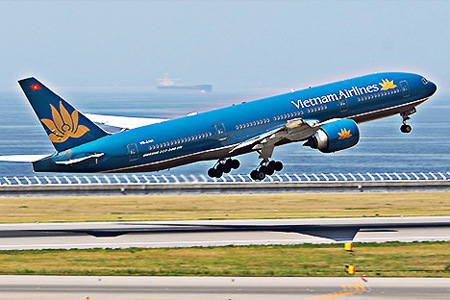Vietnam Airlines, the state carrier, provides a wide array of safe and fairly comfortable flights, both international and domestic. Things have not always been thus, but there is now a very trim fleet of modern...
Vietnam Airlines, the state carrier, provides a wide array of safe and fairly comfortable flights, both international and domestic. Things have not always been thus, but there is now a very trim fleet of modern, well maintained planes (mostly French and American: not a Russian Tupolev in sight), flown by well trained pilots. It's the safest driving you're likely to experience in Vietnam! DO consider flying if you're going a long way within Vietnam, because any other means of transport is always much slower and sometimes only slightly cheaper. DON'T get stuck in the mud: in the rainy season, road and rail are frequently flooded or even washed away in the regions that are hardest hit. DO reconfirm any flight, as this is not a superfluous precaution in Vietnam. DON'T arrive at the airport just in time for a domestic flight: your seat may well have been resold to someone else by then. Conversely, you might get lucky this way if all seats are previously declared as taken on a flight you want to take. Until recently, it was actually more expensive for foreigners to travel from Hanoi to Ho Chi Minh City by train than by air. And this for a journey that still takes a couple of days as opposed to a flight lasting a mere couple of hours! However, a dual pricing system is still in operation for air tickets. You get the same service, but it costs more because you're a wealthy foreigner. If you're not a Viet Kieu and don't have papers to prove it, DON'T imagine that you’ll find a way to get round this discriminatory practice: you won't. The only loophole we have heard of concerns spouses Vietnamese and Viet Kieu, who may be able to wangle a card somewhere entitling them to lower fares. But few things stay the same for long in modern Vietnam...

If what you're after is seeing plenty of scenery a having time to meet people and chat to them, DO let the train take the strain. Trains are still very slow, despite reports almost weekly that they are picking up extra speed. Even the much touted 'Unification Express' crawls the 1,700-odd kilo meters between Hanoi and Ho Chi Minh City. Trains are also surprisingly noisy and often rather Spartan, but they are still a very pleasant and civilized means of transport, with much more legroom than any kind of bus, and conserve some of the charm of a bygone era. On certain routes now, such as the trip from Hanoi up to Lao Cai (near Sapa) on the Chinese border, private companies are hitching refurbished carriages onto the regular trains. They offer - for a price - air conditioning, plush seats, comfy sleepers and gourmet food in a restaurant car. Long haul buses are both the fastest and cheapest means of surface travel and are plentiful throughout Vietnam. If you board a bus full of locals (buses are usually full to bursting: they don't start their journey until they are), and manage to pay the local price, it should be dirt cheap. But foreigners often find themselves being squeezed gently into minibuses full of other foreigners. Unless you have the necessary language skills and tolerance for discomfort to track down and endure the local bus, these more expensive and more comfortable (and often air-conditioned) buses may be your best bet. The more reliable ones are operated by travelers' cafes such as Sinh Cafe and Kim Cafe and serve most of the bigger towns and sites deemed interesting to foreign tourists.
DON'T opt for the bus, however, if you're prone to claustrophobia, motion sickness, are pregnant, suffer from a weak heart or actually expect to have a good time. The Vietnamese are not renowned for the safety or courtesy of their driving, (see our Ten Tips to Surviving the Traffic in Vietnam at the end of this section) and road works, potholes, water buffalo and sleep-starved truck drivers abound. Vietnamese people, especially young women, can be very prone to motion sickness. Unlike in Western countries, they have not been used since birth to traveling by car, train or boat. DO use local city buses: once you've worked out where to catch the ones you want, these present an excellent (and stunningly cheap) way of getting around. Cities in Vietnam are investing in new buses and improving the service in an effort to combat traffic congestion.



